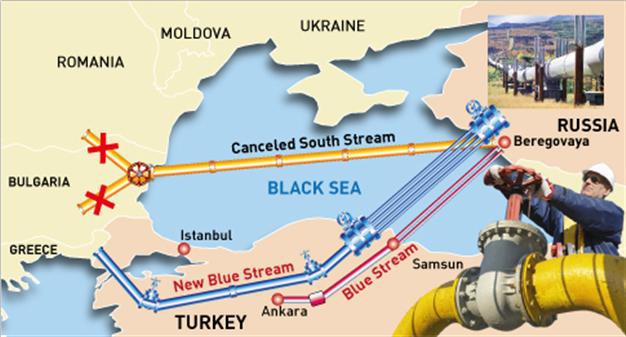Located in the Eastern Mediterranean and facing three continents, Greece, the weak link of the European Union (EU) and NATO, has strange relationships with Russia, China, Iran, Israel and Egypt. Simultaneously it is the bottleneck in migration issues, and contributes to the energy security of the EU, hosting the Trans Adriatic oil pipeline coming from the Caspian Sea. When the time comes to commercialise the gas from the Mediterranean coast of Cyprus and Israel (which is also Gaza’s, Lebanon’s and Syria’s) it will consolidate this status even more, as all the gas pipelines of this region destined for Europe must pass through Greece. But Berlin understands the “Euro” more than the geopolitical value of the Hellenic republic. Anyone would ask, “If for money, they are prepared to lynch a “European, Christian and white” partner in this way, what wouldn’t they do in other parts of the planet?”
While the European Commission, to the applause of Golden Dawn, is applying showing Greece a “Lesson in Terror”, Syriza toes the line.
Playing Russian roulette?
It was Alexis Tsipras who travelled to Moscow and not Vladimr Putin who went to Athens, pointed out the Russian leader, denying wanting to take advantage of the Greek tragedy to increase his influence in Europe. That Tsipras hasn’t asked him for financial help, could be for several reasons:
- He is aware of the power of the enemies, the EU and the USA. Even, when he could veto sanctions against Russia, he voted in favour.
- He is not confusing BRICS with Comecon of the soviet era. Here there is no common ideology, and good treatment of Moscow doesn’t mean a political alliance.
- His concern is “the debt” and not to change strategic alliances. Which means that the “Orthodox Christian Alliance” is as non-existent as the “Alliance of Muslims against the West”.
In addition, Putin wouldn’t rescue Greece “financially”, because:
- Europe is his most important economic partner and he prefers that Greece resolves its difficulties within the EU.
- He is trying to reach a peace agreement with the EU over Ukraine, and not to convert Greece into a new area of conflict.
- Greece’s problem is due to the financial system of the ECB and the IMF, and not even an injection of roubles would stop the bleeding of the Greek people.
- The Kremlin’s foreign policy is ambiguous. Examples: their position regarding the current Turkish-Syrian conflict, or the “Iranian Nuclear Deal”. Maybe because the Kremlin is still constructing an identity.
Even so, Moscow will help Greece: it will pay part of their loans through investments. There will be a “Greek gas pipeline” that will receive gas from Turkey. So, reductions in the cost of gas will be achieved, employment will be created and it will increase its weight within the EU as a provider of energy. Now the question is: Will the USA allow it, despite the fact that the project will benefit the EU?
The EU, without wanting to, has promoted a solid alliance between two of those it repudiated: Turkey and Russia, and in the process of agonizing self-destruction, it also repudiates one of its “children”.
China continues its Silk Road
Beijing will not let go of even a crumb of its prodigious reserves of foreign exchange to the Hellenes, because:
- It considers the Greek debt to be an internal matter for Europe.
- The Greek economy suffers structural problems.
- The crisis is of the whole Eurozone, and not just Greece.
- The EU is China’s biggest trading partner. They are not interested in harming this relationship for a country with which it doesn’t even have cultural, ideological or any other kind of links.
Beijing has also offered Tsipras indirect help: to integrate it into the Economic Belt of the Silk Road, investing in its infrastructure such as the renovation of the Greek railway system. China wants hard shares, like leasing the port of Piraeus, another link in the so-called Chinese pearl necklace, for 5 billion dollars over 35 years.
What worries Washington?
The Eastern Mediterranean is one of the USA’s backyards. In Greece they count on four military bases in which were kept part of their nuclear arsenal until 2001. The large naval base on Crete was used to bomb Libya, a state that together with Syria are outside of NATO. Besides “NATOising” the Eastern Mediterranean, Washington has sponsored a military-economic alliance between Israel, Cyprus and Greece with the aim of exploiting sea gas, preventing Russian companies from participating in explorations. Every year the USA carries out the “Noble Dina” naval exercises with Israel and Greece, displaying their might. Last year’s included a simulation of the “Iranian Scenario”.
Barack Obama is worried by a greater Chinese economic presence and a Russian military presence in this space and that Greece, the southern flank of NATO, could leave its orbit of influence. Obama’s demand to Berlin – who underestimates the geopolitical consequences of “Grexit” – to offer Tsipras a solution is nothing more than inter-imperial tensions, as Turkey could launch a military action against Cyprus for the Mediterranean gas and put the USA and the EU in a big mess
**
Greece doesn’t want to risk everything. It’s an extremely hard class struggle between the elite and the workers, and not a game in which everyone wins. Realpolitik lies in wait.






